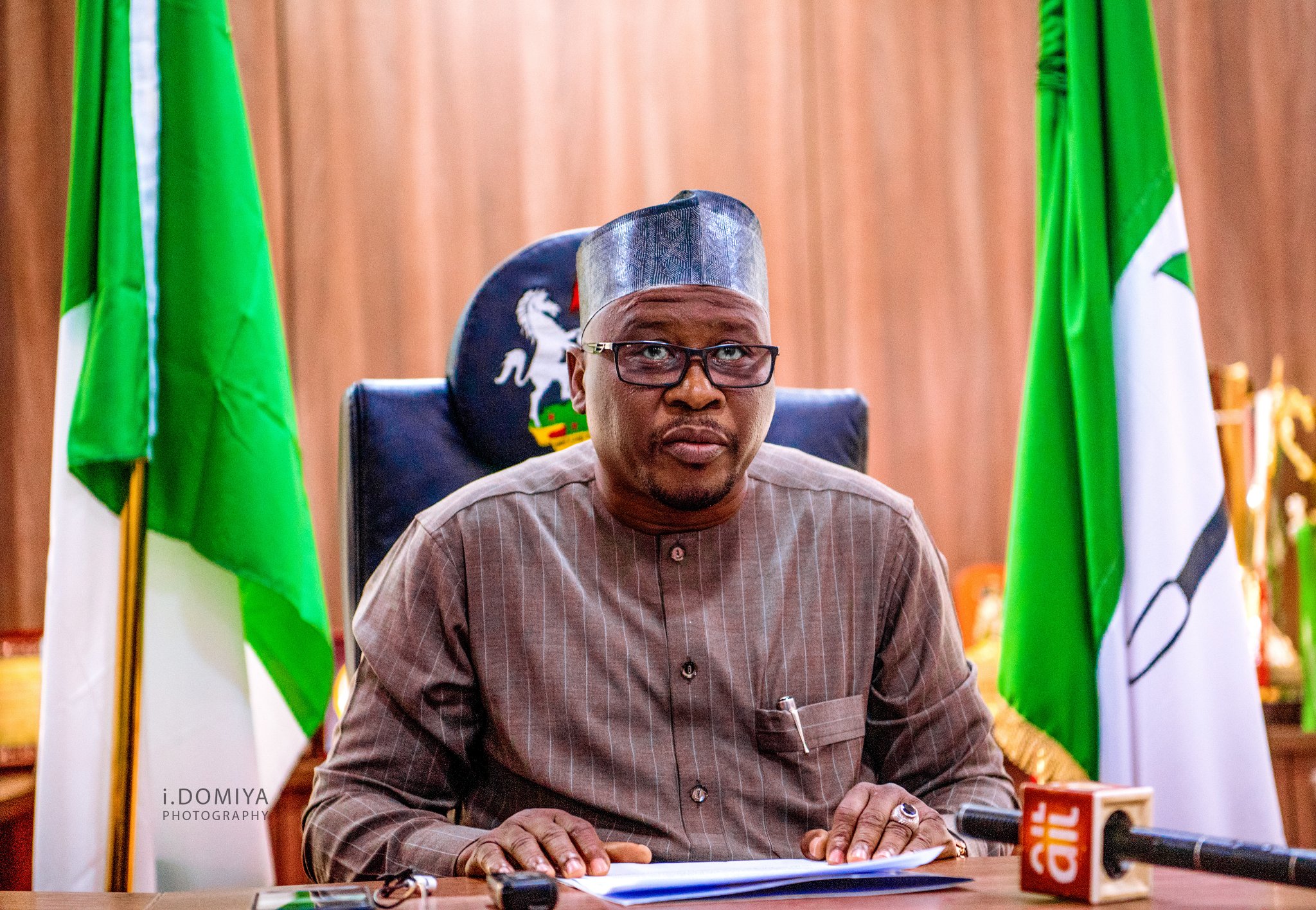Agriculture
Buhari inaugurates Agricultural Machinery Dev’t Institute to enhance food security

President Muhammadu Buhari on Saturday inaugurated the Agricultural Machinery and Equipment Development Institute (AMEDI), Lafia, to enhance food security and create jobs for the youths across the country.
AMEDI is one of the Buhari administration legacies meant to make Nigeria a hub and supplier of agro-allied technology, equipment and machinery.
The project is also aimed at making the nation self-sufficient in food production as well as creating more sustainable jobs for Nigeria’s teeming youths.
AMEDI, a multi-billion Naira product of National Agency for Science and Engineering Infrastructure (NASENI), is equipped with modern laboratories and machines for mechanised farming and agricultural development in the country.
The president, who was taken round the premises of the institute by the Executive Vice Chairman/Chief Executive of NASENI, Prof. Muhammed Sani, inspected façilities including equipment and laboratories at the institute.
While conducting the president round the facilities, Sani said the foundation laying for the construction of the institute and its inauguration was within a period of less than six months.
According to him, this is the second inauguration of NASENI projects by the president within a span of three months.
Sani said: ”We the management and staffers of NASENI are not taking this rare privilege for granted.
”The foundation laying for construction of this institute and its inauguration today is within a period of less than six months.
”Mr President may recall his directive for the establishment of six new Agricultural-Technology-based Institutes, one each per geo-political zone of Nigeria in 2021 as part of the twelve new Institutes approved to be established.
”NASENI under my leadership has developed a culture of speedy delivery on Presidential directives not only to justify the new status of the agency, but also to fast-track transition of Nigeria to a manufacturing knowledge-based economy.”
According to him, AMEDI, Lafia is the first to be completed among the six equals across the geo-political zones of the country.
Sani added that the conceptualization of the institute was targeted at the use of science and engineering infrastructure to support the presidential efforts in the attainment of food and nutritional security in Nigeria and for Nigerians.
”The peculiarity of our soil with inherent edaphic factors and peculiar topography require the production of made in Nigeria agricultural implements, machinery and equipment that can support responsible and productive agricultural practices in the face of climate change.
”We are conversant with the Sustainable Development Goals and our national expectations to end hunger and create decent cum inclusive jobs for our youth and women.
”We are resolved at NASENI to use the platforms of AMEDIs to modernise agri-business in Nigeria and ensure sustainable scaling of agro-enterprises for new jobs and wealth creation,” he added.
The EVC further stated that, as a modular agricultural institute, AMEDI Lafia and others when completed, had a template to advance the injection of Science, Technology and Innovation (STI) in the agricultural space across the country.
He said the inbuilt capabilities of the institutes would ensure the use of additive and SMART manufacturing platforms already acquired by NASENI system-wide to design, develop, assemble and produce agricultural and food processing implements for various classes of farmers.
Sani said: ”The main workshop in the institute shall become a model of SMART factory that will leverage cutting edge technologies to deliver Made- in-Nigeria products and market demand- driven services that are suitable for both our farmers and arable lands.
”The crop-livestock integration farming model to be practiced in the experimental farm of the institute is strategic to training of farmers and agro entrepreneurs on sustainable farming methods using land resource optimization models.”
According to him, AMEDI is equipped with Central Research Laboratory that will support the research activities of the institute along the various value chains of the target product lines of the institute.
Sani said that the institute had installed modern equipment for the processing of fruit juices, milk and other dairy products and tomato processing.
He said: ”Each equipment that is installed here is for backward integration and multiple and improved versions would be produced by the institute for the benefits of farmers and agro-equipment industries that would mass produce to meet the demand of the nation.”
Sani said the mandate of the institute aligned perfectly with the NASENI’s National Tractor and Heavy Duty/Machinery Recovery, Refurbishment and Redeployment project.
”The exhibition centre of the institute shall engage in show-casing of agricultural innovations and serve as a point of attraction for youth engagements in agriculture for job and wealth creation,” he further stated.
Sani thanked the president, who is also the Chairman of the Governing Council of NASENI, for granting approval for NASENI projects and programmes meant to transform and uplift the quality of life of the citizens
Agriculture
Fintiri Unleashes N2bn Boost for Farmers as Adamawa Rolls Out 2025 Agricultural Support Programme

The Adamawa State Government has launched the 2025 Agricultural Support Programme aimed at empowering smallholder farmers and enhancing food security across the state.
Commissioner for Agriculture, Prof. David Jatau, disclosed this on Friday while briefing journalists in Yola. He revealed that Governor Ahmadu Umaru Fintiri had approved a substantial N2 billion for the initiative, which targets increased agricultural productivity in the upcoming farming season.
According to Jatau, the programme—which is already underway—will provide subsidised agricultural inputs such as fertilisers, improved seeds, and other essential materials to farmers in six local government areas.
“The programme has already commenced in six LGAs—Madagali, Michika, Hong, Maiha, Demsa, and Ganye,” he said. “By next year, during the rainy season, we will extend the programme to the remaining LGAs.”
He explained that 300 hectares of farmland would be cultivated in each of the participating local governments, with 300 farmers benefitting per council.
To ensure fairness and transparency, Jatau said a multi-stakeholder committee had been constituted to oversee the beneficiary selection process. The committee comprises representatives of traditional councils, local government authorities, security agencies, youth groups, and women organisations.
“We are also equipping extension workers with training to offer farmers guidance on modern agricultural techniques for improved yield,” he added.
The commissioner noted that the intervention would not only increase food production but also generate employment, improve rural incomes, and contribute to economic stability in farming communities.
Jatau also revealed that the state government is collaborating with non-governmental organisations and agricultural development bodies, with over 2,700 hectares of farmland pledged by development partners for cultivation.
He reaffirmed the Fintiri administration’s commitment to achieving food self-sufficiency and urged beneficiaries to make the most of the programme.
Agriculture
KWASU Microfinance Bank disburses loan to farmers

The Kwara State University (KWASU) Microfinance Bank has provided loan facilities to farmer groups in and around Malete, Moro Local Government Area.
The Vice-Chancellor and Chairman of the Board of Trustees, KWASU Microfinance Bank, Prof. Jimoh Shaykh-Luqman, announced this while presenting offer letters to the farmers’ associations at a formal event held on the university campus.
Addressing the farmers, the Vice-Chancellor, represented by the Deputy Vice-Chancellor (Administration), Prof. Moshood Jimba, said the agricultural loan scheme aimed to support farmers in boosting food production and enhancing food sustainability.
“The loan is meant to support your farm operations, especially in the upcoming planting season,” he said.
Prof. Shaykh-Luqman reaffirmed KWASU’s commitment to its mantra of being a “University for Community Development,” leveraging its expertise and resources to initiate programmes that drive local development.
The Managing Director and Chief Executive Officer of KWASU Microfinance Bank, Alhaji Hakeem Hassan, noted that the agricultural loan scheme was piloted last year with 15 farmers as beneficiaries.
He added that the pilot scheme yielded positive results for both the farmers and the bank, as all beneficiaries successfully repaid their loans.
Following this success, he said, the scheme had been expanded to include more farmers under various farmers’ associations.
The News Agency of Nigeria (NAN) reports that the associations benefiting from the agricultural loan scheme include Alanu Agbelere Farmers Group, Agbedola Ketere Group, and Itesiwaju Agbe Group Omoni.
Others are Agbeloba Farmers Association (Malete Market), Agbeyewa Elemere Farmers Group, Agbe Olofeere Group, and Agbeloga Malete Farmers Group.
Speaking on behalf of the farmers, the Chairman of Agbeloba Farmers Association (Malete Market), Alhaji Mohammed Abdulrazaq, expressed gratitude to the university and the bank for their trust.
He pledged, on behalf of the beneficiaries, to utilise the loans effectively and ensure prompt repayment.
Agriculture
Kano Govt. implements N2.3bn livestock empowerment programme

The Kano State Government has begun implementing the second phase of its livestock empowerment programme valued at N2.3bn under the Kano State Agro-Pastoral Development Project (KSADP).
The Commissioner for Agriculture and Natural Resources, Dr Mamood Danjuma, disclosed this while addressing newsmen on Thursday in Kano.
Danjuma said the initiative aims to support beneficiaries with livestock, feeds, drugs, and salt lick to enhance their economic well-being.
According to him, 911 beneficiaries are being supported with two rams each, feed for three months, drugs and salt lick, while 2,386 women are being supported with two goats and a buck goat in the poorest households in the state.
He explained that the total package under the empowerment programme showed that 1,342 bulls were procured by the government at the cost of N560m, 1,822 rams were procured at the cost of N175m and 7,158 goats bought at the cost of N451m.
“Under the cattle scheme, each cattle gains 100kg over a period of 120 days. The fattening period is for 120 days, making three cycles possible in a year.
“As for the small ruminants fattening scheme, with the same 120-day fattening period yielding an extra 15kg/animal.
“The project promotes goats’ reproduction through women who will take care of the animals and sell the young ones to improve their income and standard of living,” he said.
He said that the programme promotes economic empowerment, particularly among women, by providing them with livestock to care for and sell, ultimately improving their income and standard of living.
-

 Headlines4 years ago
Headlines4 years agoFacebook, Instagram Temporarily Allow Posts on Ukraine War Calling for Violence Against Invading Russians or Putin’s Death
-

 Headlines4 years ago
Headlines4 years agoNigeria, Other West African Countries Facing Worst Food Crisis in 10 Years, Aid Groups Say
-

 Foreign3 years ago
Foreign3 years agoNew York Consulate installs machines for 10-year passport
-

 News1 year ago
News1 year agoZero Trust Architecture in a Remote World: Securing the New Normal
-

 Entertainment3 years ago
Entertainment3 years agoPhyna emerges winner of Big Brother Naija Season 7
-

 Headlines1 year ago
Headlines1 year agoNigeria Customs modernisation project to check extortion of traders
-

 Entertainment2 years ago
Entertainment2 years agoMovie download platform, Netnaija, announces closure
-

 Economy2 years ago
Economy2 years agoWe generated N30.2 bn revenue in three months – Kano NCS Comptroller



















